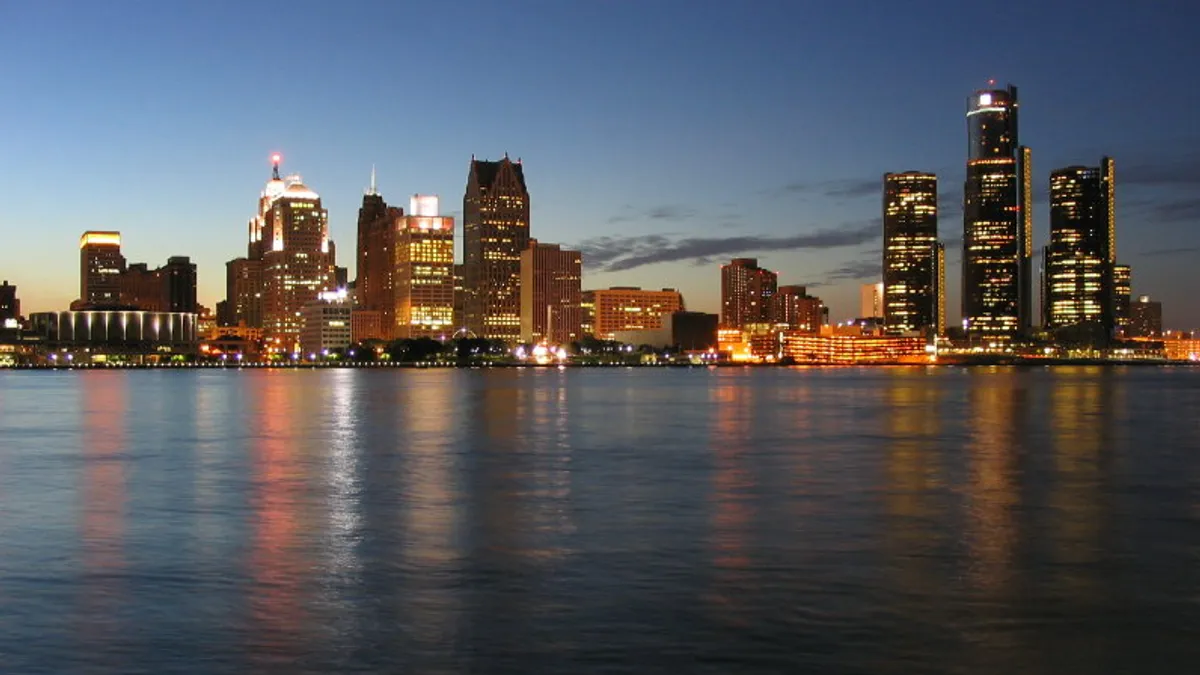Dive Brief:
- Ford is seeking nearly $239 million in tax breaks over 35 years — $104 million coming from the city of Detroit — to renovate the abandoned Michigan Central Station and nearby buildings into a development campus for autonomous vehicles (AVs) and electric vehicles (EVs), according to Crain's Detroit Business and others.
- The Detroit City Council has been asked to fast-track the city's portion of the tax breaks so Ford can begin work on the facility in late fall to prevent the 115-year-old building from deteriorating further in winter weather.
- Last December, Ford announced its intent to move AV and EV operations from its Dearborn, MI headquarters to Detroit's Corktown neighborhood. It purchased the Michigan Central Station and other neighborhood buildings in June, and in August said it would spend nearly $740 million to renovate the buildings.
Dive Insight:
Ford finds itself in a bit of a pinch with the timeline for starting the multi-year train station renovation project. The abandoned building has not been maintained for years and the interior has been partially exposed to harsh Michigan winter weather from roof leaks and sitting windowless. Real estate experts claim exposure to one more winter might make it impossible to salvage certain interior structures, including historical elements, not to mention much higher renovation costs.
But under state law, Ford cannot receive its tax incentives if it begins work on the project before approval from the State Tax Commission. If Ford begins work immediately, it loses a portion of the money it needs for renovations. Therefore, the company has been working within state and city guidelines and has requested that the city council speed up its approval process. It asked for city council approval by October 16 so it can meet an October 31 deadline for state incentives.
Crain's Detroit Business explains Ford wants "30-year breaks on real and personal property taxes, Detroit's corporate income tax and the utility users tax as well as freezing taxable values for a decade on its Corktown properties ... The remaining $135 million in tax breaks would future revenue for other local taxing jurisdictions, such as Wayne County and Detroit Public Schools Community District."
Tax incentives are a controversial topic, and this project is likely to generate plenty of debate. Detroit stands to lose out on a heap of tax dollars — approximately $3 million a year for three decades — during a time when it needs that money to fund its ongoing recovery after emerging from bankruptcy in 2014. Yet bringing a major company like Ford into Detroit's urban center is expected to fuel further development and revitalization there, in addition to bringing 5,000 direct and indirect jobs to the city center. The Detroit Economic Growth Corporation estimates the deal will bring the city a net fiscal benefit of $371 million over 35 years.
That kind of economic benefit is difficult for leaders to ignore, especially when citizens are still struggling to get back on their feet following an economic downturn and a loss of the state's auto manufacturing jobs. But leaders should still anticipate taking flak not just for providing incentives, but also for fast-tracking a huge company's request while other municipal matters, including those that would benefit small businesses, remain on the much slower traditional governmental timeline.












